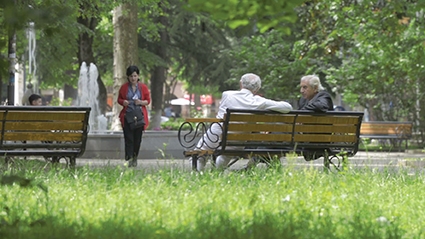Climbing Mentality Mountains: The Social Divide
Op-Ed
Something I hear quite a lot these days is that the young generation of Georgia is changing, evolving and moving with the times, away from the Soviet nostalgia or slavish adherence to Orthodox ‘traditions’ of previous generations. And it’s true, partially.
It’s been eight years since I took up residence in Tbilisi on a full-time basis. I initially installed myself in Saburtalo, but due to personal circumstances at the time, would take a monthly trip to Temqa, an outlying district more, to put it charitably, behind the times. The differences between these two places, while clear, were far less striking than they are now: the city center’s chic European-style restaurants, wannabe German brauhauses, hipster bars and American fast-food joints were all in the future back then. The people, too, also seemed far more similar than they do today; in Saburtalo, I saw the slouched, plodding walk of Georgian men dressed in black, the words falling out of their mouths as though they were too lazy to formulate them properly, and witnessed the exact same thing in Temqa. They squatted on the roadside less in Saburtalo, but still, the overall sight (chain-smoking, drinking, and staring pop-eyed at any female between fifteen and fifty who happened past) was the same.
Today, though, many teenagers in the city center dress in the same rubbish style that I did at their age (T-shirts depicting awful bands, ridiculous hairstyles, and unnecessary accessories about the hand and wrist- when I think of the money that went to wristbands and the like I could weep; they were no fools, the retail sector of the mid-2000s). This is also true for many university-educated Georgians under 35: the skin tone, eyes and hair might be darker, but in their dress there is often little to distinguish them from people of similar ages elsewhere.
I am no great appreciator of fashion beyond the importance of good suits, but I mention it here because in Georgia it has increasingly become an indicator of one’s mentality and beliefs; before anyone accuses me of over-simplifying or generalizing, consider two Georgian men: one with an earring, tight jeans and blue hair, the other with a fake leather jacket, black trousers and national beer gut, and ask which is more likely to be pro-LGBT rights.
It is deeply frustrating when foreigners and liberal Georgians voice the belief that groups such as the March of Georgians or parties like the Alliance of Patriots are supported only by khinkali-gobbling men who flock together at restaurants and bark down the phone to their wives that they’ll be home when they’re home. My own wife flatly refused to believe that an ex-girlfriend of mine had been hit by her former husband: it was inconceivable, she said, that people in their early-to-mid twenties could behave that way, or (in the former husband’s case) believe that Georgia’s future lay with Russia, not the European Union or America. Not two weeks ago did I find myself talking to another young woman barely out of her teens who told me “The Russians are not our enemies;” I’d be willing to bet that the friends and family of those who died in 2008 (and during the Soviet era) might disagree.
This all my sound rather obvious, but it does stagger me when people assume that the traditional and/or Russophile mentality will die when the hordes of boulder-belly Georgian men have kicked the bucket. From what I’ve seen of Temqa and other comparable parts of the city (inhabited by what my liberal Georgian friends derogatorily refer to as ‘village people,’ even if they were born and raised in Tbilisi), Western values have clearly not made much of a dent yet.
I predict that the following years will see this gap between liberal and conservative widen; it is happening already, of course, but I believe it will become more pronounced as time goes by. Perhaps the conservative majority will eventually become the minority. Perhaps not. My point is that not all young people are onboard with the EU, NATO and Western values, and may constitute more of an overwhelming majority than many realize.
Having a divided society doesn’t make Georgia much different from most of the West, of course: I highly doubt I’d have much in common with the people of Muslim-majority areas of Bradford or Birmingham, and I don’t think my American friends would enjoy living in the Amish societies in their own country. The real difference is that the political ramifications for Georgia would be far greater; despite the progress that has been made in the modernization of the Georgian mentality, there is still quite a mountain to climb.
Tim Ogden












